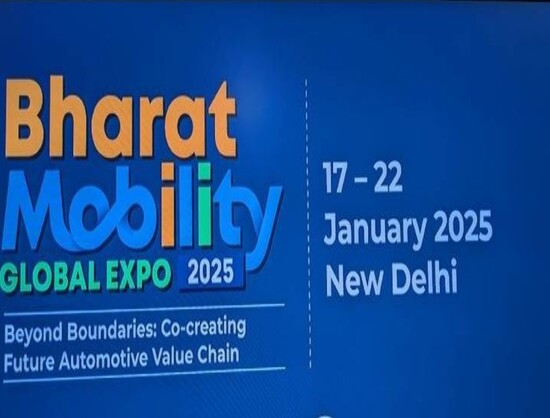Our Terms & Conditions | Our Privacy Policy
PM Modi Inaugurates Bharat Mobility Global Expo 2025, Highlights India’s Automotive Growth – Asia Pacific
At the Bharat Mobility Global Expo 2025, PM Modi emphasised India’s growing automotive sector, green mobility initiatives, and infrastructure developments. He highlighted the government’s support for electric vehicles, innovation, and sustainable transportation solutions, marking a transformative phase for India’s mobility future.
January 17, 2025. By EI News Network
Prime Minister Narendra Modi inaugurated the Bharat Mobility Global Expo 2025 at Bharat Mandapam in New Delhi on January 17, 2025. The event, taking place from January 17-22 across three venues in Delhi and Greater Noida, aims to unite the global mobility value chain, featuring over 9 concurrent shows, conferences, and regional sessions. It showcases policies and initiatives designed to foster collaboration in the mobility sector.
In his address, the Prime Minister outlined India’s promising future in the mobility sector, driven by its rapidly growing automotive industry, innovative technologies, and infrastructure development. “Driven by the aspirations of the people and the energy of the youth, India’s automobile sector is witnessing an unprecedented transformation,” he remarked. He further added that the Indian auto industry has grown by nearly 12 percent in the past year, with exports rising, thanks to the mantra of ‘Make in India and Make for the World.’
PM Modi also pointed out the growing demand for vehicles in India, stating that the annual sale of approximately 2.5 crore cars surpasses the population of many countries. This growing demand, he emphasised, is one of the reasons India is seen as a global leader in the future of mobility.
“India is currently the world’s fifth-largest economy and the third-largest passenger vehicle market,” the Prime Minister stated. He further highlighted that as India ascends to become one of the top three global economies, its automotive market will experience an even more remarkable transformation and expansion.
Several factors, including India’s large youth population, an expanding middle class, rapid urbanization, modern infrastructure development, and affordable vehicles through the Make in India initiative, were cited by PM Modi as key drivers for the future of mobility in the country.
PM Modi credited the contributions of automotive pioneers like Ratan Tata and Osamu Suzuki for shaping the Indian auto industry, noting that their legacy continues to inspire current generations and the sector as a whole.
The Prime Minister also underscored India’s focus on enhancing ease of travel. He highlighted that INR 11 lakh crore has been allocated for infrastructure development, which includes the construction of multi-lane highways and expressways. He mentioned the PM GatiShakti National Master Plan as a key initiative aimed at improving multimodal connectivity and reducing logistics costs. These infrastructure improvements, along with technological advancements like FASTag and the National Common Mobility Card, are contributing to India’s transition towards smart mobility solutions.
Focusing on green mobility, PM Modi reiterated the government’s commitment to the development of green technologies, electric vehicles (EVs), hydrogen fuel, and biofuels. He emphasised India’s aim to reduce its fossil fuel imports through cleaner, more sustainable alternatives. The Prime Minister shared the impressive growth of the EV sector, with sales increasing 640 times over the past decade. From just 2,600 EVs sold annually a decade ago, more than 16.80 lakh were sold in 2024 alone. He projected that this number could increase eightfold by the end of the decade, demonstrating the immense potential of electric mobility in India.
Underlining the government’s support for electric mobility, PM Modi highlighted initiatives like the FAME-2 scheme, which has subsidized the purchase of over 16 lakh EVs, including 5,000 electric buses, and the PM E-Drive scheme, designed to support the purchase of millions more EVs, including buses, two-wheelers, e-ambulances, and e-trucks. He also emphasised the installation of 70,000 fast chargers across the country to facilitate EV adoption.
PM Modi acknowledged the critical role of the Make in India initiative in driving the growth of the auto industry, pointing to the PLI scheme, which has stimulated a surge in sales and created over 1.5 lakh direct jobs. He also noted that the government’s efforts have led to over USD 36 billion in Foreign Direct Investment (FDI) in the sector in the last four years, with expectations for continued growth.
The Prime Minister also stressed the importance of solar power and alternative fuels in addressing climate change. As part of India’s G-20 presidency, there is a strong emphasis on building a green future. He highlighted the government’s focus on solar power, battery storage, and energy innovation, including a INR 18,000 crore PLI scheme for advanced chemistry cell battery storage. PM Modi encouraged the youth to consider starting startups in energy storage, fostering a sustainable future for India.
In his closing remarks, PM Modi reaffirmed the government’s commitment to supporting the auto industry through policies that promote innovation, sustainability, and global partnerships. He also urged manufacturers to take advantage of the vehicle scrapping policy, which will help reduce environmental impact and increase demand for new vehicles.
Images are for reference only.Images and contents gathered automatic from google or 3rd party sources.All rights on the images and contents are with their legal original owners.



Comments are closed.